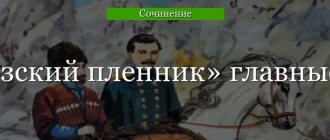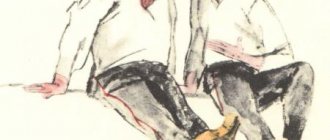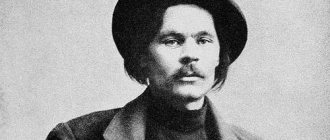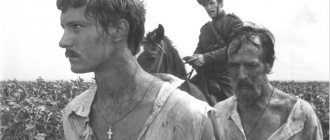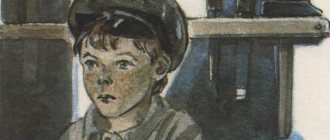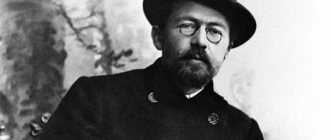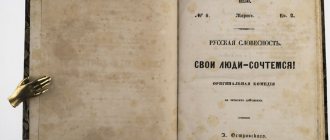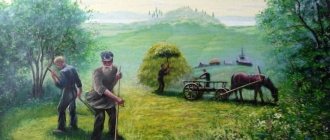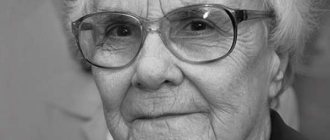Essay on the work “Prisoner of the Caucasus”
Option 1
Zhilin and Kostylin served as officers in the Caucasus. The first was from an impoverished landowner family, and the second from a rich one. Zhilin did not have great physical attributes: he was not tall, but he was strong, smart, and brave. Kostylin is a heavyset, plump and weak-willed man.
The story shows the relationships between people of different nations, genders and ages. Here human vices are revealed: cowardice, greed, betrayal, arrogance, cruelty, vindictiveness. But love, friendship, trust, courage, kindness, perseverance and resourcefulness prevail and lead to a happy ending.
In captivity, Zhilin tried to take a closer look at people, tried to get to know them better, kept himself busy with work all the time, even “healing” sick enemies. All this bore fruit - he met a girl, Dina. The characters of Zhilin and Tatar Dina are similar: kind, caring, sincere and brave. The little girl and the grown man quickly found a common language, and in response to the simple toys Zhilin gave him, Dina brought him either a piece of fried lamb, or flat cakes or milk, and most importantly, she saved his life.
Throughout the entire work, Kostylin showed himself on the negative side. This is cowardice and betrayal when meeting enemies. The moment Zhilin and Kostylin saw the Tatars, he immediately dropped his gun and let his horse run away, without even thinking about his comrade; inaction and isolation in captivity, he did not even have the thought of escape. He did not talk to the Tatars, because he considered himself superior to them, did not communicate with the inhabitants of the village, just waited for the ransom; selfishness and indifference towards Zhilin appeared both at the moment when they met the Tatars, and in the first escape, when Kostylin refused to go and groaned and moaned all the time, which allowed the Tatars to find them.
After the failed escape, life for the captives got even worse. But even under these conditions, the brave Zhilin did not fold his arms and continued to dream of escape. And at that moment, something seemed to awaken in Kostylin, and he committed the first and only noble act throughout the entire work - he refused to go on the second escape, so as not to become a burden to Zhilin.
After all the difficulties, Zhilin successfully escaped from captivity, “and Kostylin, barely alive, was brought in only a month later.” The main idea of the story is the meaninglessness of war. The result of a war between peoples and states is always sad: huge casualties and losses. And friendship is eternal!
Option 2
At the end of the 19th century, the great Russian writer L. N. Tolstoy wrote the story “Prisoner of the Caucasus,” in which he partially retold the story of how he himself was captured by the Tatars during his service in the Caucasus.
One of the main characters of the story is officer Zhilin, who comes from poor nobles. His elderly mother asked to visit her, and for this he left the garrison, going along with the convoy.
On the way, the hero was captured by the Tatars. This happened due to the fact that his comrade by the name of Kostylin abandoned him, galloping away with the gun. Zhilin was taken to the village, put in stocks and locked in a barn. In the morning he was sold to Abdul. The owner ordered his daughter Dina to give the prisoner bread and water, and that’s how he and the girl met. Despite the fact that the foreigner alarmed Dina, he simultaneously aroused her interest. After some time they became friends. Zhilin entertained the girl by fashioning dolls out of clay for her, and she secretly brought him delicious food (cakes and meat). In captivity, he nevertheless met with Kostylin, he was also caught and sold to the same owner.
Over time, the hero got along with the Tatars, helped them in every possible way, and Abdul locked him in the barn only at night. But he still remained a prisoner and dreamed of escaping. To do this, he dug a tunnel for a long time. And one night Zhilin, together with Kostylin, attempted to escape, but, unfortunately, was unsuccessful. They were caught and brought back to the village. There the fugitives were again shackled and thrown into a pit. But the owner’s daughter again came to Zhilin’s aid. She helped him escape without caring about her own fate. The hero has to overcome a long distance with stocks on his feet, but he gets out.
The story turned out to be very interesting and instructive. It is written simply, without embellishment. I think the author wanted to say that you should never give up. You can find a way out of any situation if you want it badly enough and put in the effort.
Option 3
I read Leo Nikolaevich Tolstoy’s story “Prisoner of the Caucasus” with great pleasure. In general, I love books about war and about the adventures of real heroes, and I especially liked this one. The author described the events very realistically. He probably succeeded because he himself participated in the war that he tells readers about.
There are three main characters in Tolstoy’s work. These are Russian army officers Zhilin and Kostylin, and also a girl, Dina, the daughter of a Tatar. Events take place at the end of the 19th century, when Russia was at war with the highlanders in the Caucasus. Zhilin is a positive hero. He is brave, strong, honest, hardworking, determined and very driven. This is exactly what I believe a man and a real soldier should be. “But how then did this warrior end up captured?” - you ask. And Kostylin was to blame for everything, because of whose cowardice his comrades fell to the Tatars. This Kostylin is not at all like Zhilin. One can hardly follow an example from him. He is lazy, cowardly and irresponsible - he wants other people to do everything for him. And Kostylin always whines and complains instead of acting.
When the officers were captured, the Tatars demanded a ransom for them. They wanted five thousand each. Kostylin was waiting for this money to be given for him and wrote a letter to his family. But Zhilin is a completely different matter. He did not intend to upset his sick mother and decided that he would get out of the trap himself. In the meantime, I looked closely at the Tatars and even managed to make friends with them. His owner's daughter Dina especially liked Zhilin. She felt sorry for the officer and brought him food. She can also be considered a positive hero, because the girl took a lot of risks helping the prisoner. And so, the first escape attempt was made. Zhilin did not want to leave his comrade alone and persuaded him to go too. And again because of Kostylin everything failed! His shoes were rubbing and he refused to go further. He whined and complained all the way until Zhilin carried him on his back. And despite the fact that he was much thinner than his fat friend!
Due to Kostylin’s whims, it was not possible to go far, and the soldiers were caught by the Tatars. This was the most exciting moment for me. I was very worried about Zhilin, who had done so much to escape... And now he was facing certain death. The officers were returned to the same Tatar. And the girl Dina again began to feed them. The conditions were terrible - much worse than the first time. And, probably, if not for her care, the prisoners would have died of hunger. And then Dina helped Zhilin escape again. She brought him a tall pole, and he was able to climb out of the deep hole. But Kostylin refused to escape. He stayed to wait for the ransom.
The story “Prisoner of the Caucasus” ended well. Zhilin managed to get to his own people, and he went to fight again. And even Kostylin was released. His comrades sent money for it. I believe that in his work the author wanted to show what a real man should be. Even his enemies respect him! But you can’t be like Kostylin. Laziness, cowardice and weakness harm not only him, but also those around him. You can say that he is a real parasite!
After reading the story, I realized: if you are brave, determined and purposeful, you will succeed. A dream will definitely come true for those who stubbornly go towards it and do not hide from danger in the bushes!
Essay on the story “Prisoner of the Caucasus”
Leo Tolstoy's story "Prisoner of the Caucasus" is based on real events that occurred in the Caucasus during the war between the Russians and the highlanders. The information for this story was events from the life of L.N. himself. Tolstoy in the Caucasus and the memories of soldiers and officers who fought during that war and were captured.
Zhilin and Kostylin served as officers in the Caucasus. The first was from an impoverished landowner family, and the second from a rich one. Zhilin did not have great physical attributes: he was not tall, but he was strong, smart, and brave. Kostylin is a heavyset, plump and weak-willed man.
Does your teacher check for plagiarism? Order a unique work from us for 250 rubles
Connect with us:
The story shows the relationships between people of different nations, genders and ages. Here human vices are revealed: cowardice, greed, betrayal, arrogance, cruelty, vindictiveness. But love, friendship, trust, courage, kindness, perseverance and resourcefulness prevail and lead to a happy ending.
In captivity, Zhilin tried to take a closer look at people, tried to get to know them better, kept himself busy with work all the time, even “healing” sick enemies. All this bore fruit - he met a girl, Dina. The characters of Zhilin and Tatar Dina are similar: kind, caring, sincere and brave. The little girl and the grown man quickly found a common language, and in response to the simple toys Zhilin gave him, Dina brought him either a piece of fried lamb, or flat cakes or milk, and most importantly, she saved his life.
Throughout the entire work, Kostylin showed himself on the negative side. This is cowardice and betrayal when meeting enemies. The moment Zhilin and Kostylin saw the Tatars, he immediately dropped his gun and let his horse run away, without even thinking about his comrade; inaction and isolation in captivity, he did not even have the thought of escape. He did not talk to the Tatars, because he considered himself superior to them, did not communicate with the inhabitants of the village, just waited for the ransom; selfishness and indifference towards Zhilin appeared both at the moment when they met the Tatars, and in the first escape, when Kostylin refused to go and groaned and moaned all the time, which allowed the Tatars to find them.
After the failed escape, life for the captives got even worse. But even under these conditions, the brave Zhilin did not fold his arms and continued to dream of escape. And at that moment, something seemed to awaken in Kostylin, and he committed the first and only noble act throughout the entire work - he refused to go on the second escape, so as not to become a burden to Zhilin.
After all the difficulties, Zhilin successfully escaped from captivity, “and Kostylin, barely alive, was brought in only a month later.” The main idea of the story is the meaninglessness of war. The result of a war between peoples and states is always sad: huge casualties and losses. And friendship is eternal!
“Prisoner of the Caucasus” - essay according to plan (grade 5)
Option 1
Plan
- Zhilin and Kostylin
- Characteristics of prisoners of war
- My opinion
L.N. Tolstoy is a great Russian writer. The heroes of his story “Prisoner of the Caucasus”: Zhilin and Kostylin.
Zhilin in the story is a positive hero. He is strong, honest, with a kind soul and is ready to move forward no matter what. He is a very good soldier. However, he is captured by the Tatars. And why? The answer is simple: because of the cowardice of his comrade. Kostylin is endowed with completely opposite character traits - cowardly, lazy and not responsible. He is pathetic, constantly whines and wants other people to do everything for him. One can hardly follow an example from him.
The Tatars captured them for ransom. Kostylin wrote a letter home, sat and waited for a ransom to be given for him. But Zhilin is quite the opposite - he did not want to upset his sick mother and decides to get out himself. He would have succeeded if not for his comrade, who let him down for the second time.
The story ends with Zhilin finally getting out on his own. And Kostylin waited a long time for his freedom. It is not for nothing that this instructive work is included in the school curriculum. It teaches children to be honest and achieve everything on their own, as Kostylin did. When trouble happens, you need to think not only about yourself, but also about your loved ones.
Option 2
Plan
- Dina
- Friendship between Dina and Zilina
- My opinion
Work by L.N. Tolstoy's "Prisoner of the Caucasus" tells about the everyday life of people, about their qualities, about kindness and honor. The story described is based on real events that took place in the Caucasus. But we will talk about the girl Dina. Dina is the daughter of a Tatar to whom Zilina and Kostylin were sold. The father ordered his daughter to give bread and water to Zhilin, and that’s how they met. This man interested Dina, because he was a stranger, and at the same time frightened her.
After some time they became friends. Zhilin made clay toys for her and other children. And she, in gratitude for this, secretly brought him delicious food, meat and cakes. The girl was imbued with kindness and sympathy for the prisoner, because he tried to do good to the best of his ability. After an unsuccessful escape, the soldiers are thrown into a pit. The only food they brought was raw dough, but even here the girl comes to the rescue and also stealthily brings them food. When Ivan was about to run away for the second time, Dina helped him with this too. The thirteen-year-old girl dared and lowered a long stick into the hole, using which Zhilin climbed out.
In the story, kindness is expressed through the main character, Dina. This girl is very kind to everyone who treats her well. At the same time very brave. She saved the officer's life and is worthy of admiration. The girl was not afraid of her father, she fought for the life of a man who gave her goodness and a piece of happiness.
Option 3
Plan
- Heroes of the story
- Everyone's choice
- My opinion
The story “Prisoner of the Caucasus” was written by the great writer Lev Nikolaevich Tolstoy. The story is about war, about human kindness, about the persistent desire to find a way out in a difficult life situation. The main characters are Zhilin, Kostylin and Dina. Zhilin goes to visit his sick mother. On the way home he meets his friend. However, they are captured due to Kostylin’s fault.
While in captivity, the officers behave differently: Kostylin expects a ransom to be given for him and is constantly afraid. Doesn't want to do anything. But Zhilin is the opposite, he remains strong and does not lose his composure. Ivan seeks to escape by all possible means. While in captivity, he meets Dina, the daughter of a Tatar. He makes clay dolls for the girl, and she secretly feeds him for it. They became friends. After the first unsuccessful escape, the prisoners were thrown into a pit. When Zhilin tries to escape a second time, she helps him get out of the hole.
So what does the story teach? First of all, you should never give up. Zhilin tried to escape, but he succeeded. He did not lose heart. And secondly, it is love for people. Dina helped a complete stranger, one might say an enemy. He did good and was loved in the village. So, each hero got his own.
↑ 1 option
Plan
1. Zhilin and Kostylin
2. Characteristics of prisoners of war
3. My opinion
L.N. Tolstoy is a great Russian writer. The heroes of his story “Prisoner of the Caucasus”: Zhilin and Kostylin.
Zhilin in the story is a positive hero. He is strong, honest, with a kind soul and is ready to move forward no matter what. He is a very good soldier. However, he is captured by the Tatars. And why? The answer is simple: because of the cowardice of his comrade. Kostylin is endowed with completely opposite character traits - cowardly, lazy and not responsible. He is pathetic, constantly whines and wants other people to do everything for him. One can hardly follow an example from him.
The Tatars captured them for ransom. Kostylin wrote a letter home, sat and waited for a ransom to be given for him. But Zhilin is quite the opposite - he did not want to upset his sick mother and decides to get out himself. He would have succeeded if not for his comrade, who let him down for the second time.
The story ends with Zhilin finally getting out on his own. And Kostylin waited a long time for his freedom. It is not for nothing that this instructive work is included in the school curriculum. It teaches children to be honest and achieve everything on their own, as Kostylin did. When trouble happens, you need to think not only about yourself, but also about your loved ones.
Essay “Zhilin and Kostylin: comparative characteristics of heroes”
Option 1
Plan
- Introduction
- Main part
- How do heroes behave in a situation of mortal danger? (Meeting with the Tatars, when the heroes are captured)
- How do heroes behave when a ransom is demanded from them?
- How do heroes behave in captivity?
- How do the heroes behave during their escape?
- What was the fate of the heroes?
- Conclusion.
- How to cultivate qualities worthy of respect?
Why do people behave differently when faced with the same circumstances? Why do some evoke our respect and others our contempt? The story of L.N. makes you think about these questions. Tolstoy "Prisoner of the Caucasus".
When Zhilin met the Tatars, he shouted to Kostylin: “Bring the gun!” But Kostylin was not there, he ran away like the last coward. Then Zhilin thought: “Even though I am alone, I will fight to the last!” I won’t give in alive!”
In captivity they behave differently. Zhilin made dolls, repaired things and thought about how to escape. Kostylin slept and did nothing. Zhilin did not immediately write a letter, so as not to upset his relatives, but Kostylin quickly wrote a letter and waited for the ransom.
Zhilin tried to find a way to escape, and Kostylin lowered his hands and waited for them to be rescued. Residents of the village treat Zhilin with respect. The attitude towards Zhilin is much better than towards Kostylin, because Zhilin helped everyone, repaired things, made dolls, treated people, and did not lie and sleep.
The characters of these heroes are completely different. Zhilin is stubborn, always gets his way and wins, he wanted to escape - he was the first to escape, and Kostylin was ransomed barely alive. I would imitate Zhilin, as he is brave, worthy of respect, and persistent.
It was not very pleasant for me to read about Kostylin, he always hesitated, was lazy, but I enjoyed reading about Zhilin: he was captured again because of Kostylin, but even the second time he offers to run away with him, does not abandon him.
People, finding themselves in the same circumstances, behave differently because they have different characters. Some people command respect because even in difficult situations they do not lose their pride and dignity.
From childhood you need to accustom yourself to dignity in order to do the same as Zhilin in a difficult situation.
Option 2
Why do people behave differently when faced with the same circumstances? Why do some evoke our respect and others our contempt? The story of L.N. makes you think about these questions. Tolstoy "Prisoner of the Caucasus".
“Two officers served in the Caucasus: Zhilin and Kostylin,” this is how the story begins.
One day they left the fortress, accompanied by soldiers. It was a hot summer then, and the convoy was moving very slowly. Kostylin suggested that Zhilin go alone, because he had a gun.
Having driven into the gorge, they saw the Tatars. Kostylin forgot at that very second both about his friend and about the gun and rushed headlong into the fortress. He did not think that Zhilin was in great danger. Kostylin didn’t even want to try to help his comrade. When Zhilin realized that he could not escape the pursuit, he decided that he would not give up so easily and would kill at least one Tatar with a saber.
Zhilin was nevertheless captured. He had been in the village for several days already. The Tatars immediately began to demand ransom. Soon Kostylin was brought to the village. It turns out that he had already written a letter home asking for a ransom of five thousand rubles to be sent. Zhilin is bargaining because he is thinking about his mother, who will not be able to find that kind of money. And he writes the address on the letter incorrectly, since he decided to escape from captivity on his own.
In captivity, Zhilin did not become limp. He made dolls for Dina and other children, repaired watches, “treated” or walked around the village. Zhilin was looking for a way to escape. I was digging in the barn. And Kostylin “only slept or sat in the barn for whole days and counted the days until the letter would arrive.” He did nothing to save himself.
And so they ran away. Kostlin constantly complained of pain in his legs, shortness of breath, he did not think about caution, he screamed, although he knew that a Tatar had recently driven past them. Zhilin behaved like a man. He did not escape from captivity alone, but called Kostylin. He put Kostylin, who was aching from pain in his legs and fatigue, on his shoulders, although he himself was not in the best shape. This escape attempt nevertheless failed due to Kostylin’s behavior.
In the end, Zhilin escaped from captivity. Dina helped him with this. Kostylin was bought out barely alive a month later.
This is how different characters influence a person’s destiny. Zhilin inspires my respect for his strong character, courage, endurance, ability to stand up for himself and for his comrade, and determination. Kostylin only gets contempt because of his cowardice and laziness.
It seems to me that qualities worthy of respect need to be cultivated small, because this is how we begin to cultivate in ourselves the qualities that Zhilin possessed!
Option 3
How to cultivate qualities worthy of respect? Why do people behave differently when faced with the same circumstances? Why do some evoke our respect and others our contempt? The story of L.N. makes you think about these questions. Tolstoy "Prisoner of the Caucasus".
Zhilin and Kostylin are two officers who served in the Caucasus.
Kostylin, when he saw the Tatars, showed his cowardice and abandoned his comrade in trouble: “And Kostylin, instead of waiting, as soon as he saw the Tatars, he ran as fast as he could towards the fortress.” Zhilin, unlike Kostylin, showed himself heroically and fought for his freedom to the end: “... I won’t give in alive.”
When they were both taken prisoner and they began to demand a ransom from them, Kostylin was afraid for his life and did everything as the owner told him. Zhilin was not afraid of the Tatar threats and did not want to pay the ransom, as he planned to escape.
Kostylin sat in the barn all day long, waiting for money. Zhilin proved himself to be a skillful person and worthy of the owner’s trust. But when Zhilin walked around the village, he tried to come up with an escape plan.
When Zhilin suggested that Kostylin flee, he tried to dissuade him, he was afraid that they would be noticed. Zhilin knows from the stars which direction to go. But Kostylin did not last long; he gives up and tells his comrade to leave him. Zhilin was not a person like Kostylin, and therefore could not abandon his comrade in trouble. The Tatars noticed them, “... grabbed them, tied them up, put them on horses, and drove them away.”
The life of the heroes has become even worse. But Zhilin, even in such a situation, continued to think about escape. When he suggested this to his comrade, Kostylin, it seems to me, committed the only human act. He didn't want to be a burden to his comrade. Zhilin successfully escaped from captivity, “and Kostylin, barely alive, was brought in only a month later.”
Each person behaves differently in the same situations. It seems to me because of human qualities. Some people think only about themselves, like Kostylin. Others, such as Zhilin, think about others: “... it’s not good to abandon a comrade.”
Some people command respect because they think not only about themselves, but also about others. They do not despair, but continue to fight, like Zhilin: “... I won’t give in alive.” Others do whatever they are told. And they abandon their comrades, like Kostylin: “And Kostylin, instead of waiting, as soon as he saw the Tatars, he ran as fast as he could towards the fortress.”
It seems to me that these qualities are brought up in the family. We must overcome our fears.
Option 4
Why do people behave differently when faced with the same circumstances? Why do some evoke our respect and others our contempt? Zhilin and Kostylin are the heroes of the story by L.N. Tolstoy, officers.
When meeting with the Tatars, Zhilin showed courage, fearlessness and did not want to give up completely, but Kostylin acted like a coward and a traitor. He left his comrade in trouble and ran away.
When they demanded a ransom from Zhilin and Kostylin, our heroes behaved differently. Zhilin bargained and did not yield, and besides, he wrote the wrong address. He, like a real man, relied only on his own strength. Kostylin, on the contrary, did not resist and wrote a letter asking to be redeemed for five thousand coins.
In captivity, Zhilin and Kostylin manifest themselves differently. Zhilin tried to win over the village residents. He was a jack of all trades: he fixed things, made toys for children and much more. Meanwhile, Kostylin did nothing, slept and waited for the ransom. Zhilin believed in himself and hoped for the best, but Kostylin showed his laziness, cowardice and weakness.
During the escape, Zhilin showed courage and devotion towards his comrade. Zhilin was more resilient than Kostylin, although he was tired, he continued to walk. Kostylin was weak and unstable. That's why they were caught.
The fate of our heroes turned out differently. Zhilin did not lose hope and made a second escape. This escape turned out to be successful. Kostylin was bought out a month later. He was barely alive.
Thus, throughout the entire story, Zhilin demonstrates his courage and courage, and Kostylin demonstrates laziness and cowardice.
People, finding themselves in the same circumstances, behave differently, because not everyone has enough self-control and fortitude... Some are stronger, some are weaker. It seems to me that everything depends on the character of the person. Some people earn our respect because they do good and courageous things, while others deserve contempt because they are cowardly and show bad sides of their character. To cultivate qualities worthy of respect, you must try to overcome your fears and sometimes not be afraid to take risks.
Essay on the topic “Prisoner of the Caucasus”, 5th grade
I believe that Tolstoy’s work “Prisoner of the Caucasus” raises many problems of modern society. Problems of human cowardice and betrayal, problems of the meaninglessness of human wars that take human lives and bring nothing but misfortune. All this could have been avoided if we had eradicated one quality in ourselves - human stupidity.
The story tells us about the difficult fate of the main character, Zhilin. Zhilin is an officer from poor nobles, a brave, hardworking and honest man, relying only on himself in life. Returning home from the Caucasus, he and his colleague Kostylin are captured. Kostylin, in my opinion, is a negative character in this story. Being a rich officer, he relies only on his money. He is characterized by meanness and cowardice, which appears more than once in the story. After they are captured, the heroes are kept in a barn, demanding a ransom for them. This is where all the qualities of the main characters are revealed.
Zhilin does not sit idly by. His powers of observation and resourcefulness helped him avoid being captured. He helps local residents, fixes their small things, and makes toys for children. He also became friends with his “master’s” daughter Dina. She takes great pity on the prisoner and brings him bread and milk. Zhilin cannot hope for a ransom, since he has only one old woman at large - his mother, so he decides to escape. Having dug a tunnel and taking his unfortunate comrade with him, he rushes to freedom, but due to Kostylin’s slowness and weak character, his plan fails. Their situation worsens and they are now thrown into a pit and kept there.
After some time, with the help of Dina, Zhilin still manages to escape, but without Kostylin. The story shows us that Zhilin is a person “with character”, capable of heroic deeds in order to achieve a goal. He never doubted for a minute that he would be able to get out of captivity, and did everything possible to free himself.
The main idea of this story, I believe, is the human ability to never give up, to face difficulties head on and achieve your goal. Zhilin is the personification of courage and bravery. Thanks to his willpower, he was able to return home. As for Kostylin, it is clear that he is the opposite of the main character; after a month he was finally ransomed, and he returned home barely alive.
The story of Lev Nikolayevich Tolstoy even now, in the present time, has not lost its relevance. Simple and clear - these words can describe the story. The author is very hurt by the fact that so many people die in war. Therefore, the meaninglessness of war is also one of the main problems of the work.
Along with the article “Essay on the topic “Prisoner of the Caucasus,” 5th grade” read:
Essay on the topic “The days of the week tell about themselves”, 5th grade
Essay on the topic “Zhilin and Kostylin: different destinies”, 5th grade
(votes: 3, average: 3.00 out of 5)
Share:
Characteristics of Zhilin from the story “Prisoner of the Caucasus”
Option 1
Zhilin is the main character of the story “Prisoner of the Caucasus.”
He is used to achieving everything himself. He is quite a charming character and immediately evokes sympathy. He is brave, in captivity he behaved boldly and confidently. Even the yard dog loved Zhilin because he fed her, this once again proves that Zhilin is a positive character. Throughout the entire story, he is contrasted with Kostylin - the complete opposite of Zhilin. Thus, the author emphasizes the positive qualities of Zhilin. Over time, even the harsh Tatars warmed to him. Zhilin did not abandon Kostylin even during the chase, after which they were caught. Before this, he gained the trust of Dina, who helped him escape. I believe that Zhilin is a shining example of a person with a truly broad Russian soul.
Option 2
The whole story describes to us those events when Tolstoy miraculously managed to escape pursuit, but two of his comrades were captured. Something had to be done. These were two Russian officers - Zhilin and Kostylin. What immediately catches your eye is that their names are very consonant, but completely different in meaning.
The character of both heroes is also very different. When Zhilin was on his way to his mother, he picked up Kostylin along the way. During the trip they were attacked by the Tatars. Zhilin behaved very bravely and began to defend himself, while Kostylin immediately ran to the fortress. But even such cowardice could not save him.
In captivity, the heroes also behave differently. When the Tatars told them about the amount of 5,000 rubles that they had to pay, Kostylin immediately wrote a letter home and waited for the money. Zhilin, on the contrary, agreed only to 500 rubles, and sent the letter to another address, because most of all he did not want his mother to worry. Kostylin was constantly bored while he was waiting for money; he planned an escape to Zhilin, digging a hole at night. While living in captivity, Zhilin often showed himself to be a very decent and kind person. He made a clay doll for the owner’s daughter, and then repaired the owner’s watch. Since then, people constantly came to him and asked for help.
So they lived until Zhilin dug a hole. One night they both got out and ran into the mountains. All the way, Kostylin was a burden to his comrade. HE did not want to take off his worn-out shoes, which made it painful for him to walk, he was fat and could not climb the mountain on his own and constantly groaned and screamed, which once attracted the attention of a Tatar passing nearby. Zhilin did not abandon his comrade, but picked him up and carried him. Of course, he could not escape with such a load. They were captured again and thrown into a pit.
Being in the pit, they felt very bad. Kostylin constantly moaned, but Zhilin kept thinking about escape. One day he was able to persuade the owner’s daughter to help them get out. The girl took pity and brought a large pole, but Kostylin did not want to run. So Zhilin had to go alone. He was able to reach his people and began to serve further. As for Kostylin, he lay in a hole until he was bought out for 5,000 rubles. They brought him in barely alive.
Every reader has a question why Tolstoy called his story “Prisoner of the Caucasus”, because there were two prisoners. But actually there is a very deep thought here. Zhilin was brave, strong, hard-working. He was able to escape from captivity and began to continue serving and helping people. But Kostylin was lazy. Yes, he was redeemed from captivity, but he remained captive of his weaknesses.
At first glance, the same event happened to two people, but if you look at the hearts and spirit of the heroes, then each experienced their own adventure.
↑ Option 2
Plan
1. Dina
2. Friendship between Dina and Zilina
3.My opinion
Work by L.N. Tolstoy's "Prisoner of the Caucasus" tells about the everyday life of people, about their qualities, about kindness and honor. The story described is based on real events that took place in the Caucasus. But we will talk about the girl Dina. Dina is the daughter of a Tatar to whom Zilina and Kostylin were sold. The father ordered his daughter to give bread and water to Zhilin, and that’s how they met. This man interested Dina, because he was a stranger, and at the same time frightened her.
After some time they became friends. Zhilin made clay toys for her and other children. And she, in gratitude for this, secretly brought him delicious food, meat and cakes. The girl was imbued with kindness and sympathy for the prisoner, because he tried to do good to the best of his ability. After an unsuccessful escape, the soldiers are thrown into a pit. The only food they brought was raw dough, but even here the girl comes to the rescue and also stealthily brings them food. When Ivan was about to run away for the second time, Dina helped him with this too. The thirteen-year-old girl dared and lowered a long stick into the hole, using which Zhilin climbed out.
In the story, kindness is expressed through the main character, Dina. This girl is very kind to everyone who treats her well. At the same time very brave. She saved the officer's life and is worthy of admiration. The girl was not afraid of her father, she fought for the life of a man who gave her goodness and a piece of happiness.
The meaning of the title of the story “Prisoner of the Caucasus” (essay)
The story "Prisoner of the Caucasus". This is a realistic work, which vividly and vitally describes the life of the mountaineers and depicts the nature of the Caucasus. It is written in a language accessible to children, close to fairy tales. The story is told from the point of view of the narrator. The main events are grouped around the adventures of the Russian officer Zhilin, who was captured by the highlanders. The plot of the story develops dynamically, the actions of the hero are presented as a series of colorful, expressive pictures. The escape of Zhilin, who was in a hurry to hide in the dark, is depicted tensely and dramatically: “He is in a hurry, but the month is getting out faster and faster; the tops of their heads began to glow to the right. I began to approach the forest, a month emerged from behind the mountains - white, as light as day.”
The main device of the story is opposition; The prisoners Zhilin and Kostylin are shown in contrast. Even their appearance is depicted in contrast. Zhilin is outwardly energetic and active. “He was a master of all kinds of needlework,” “Even though he was short in stature, he was brave,” the author emphasizes. And in the appearance of Kostylin, L. Tolstoy brings to the fore unpleasant features: “the man is overweight, plump, sweating.” Not only Zhilin and Kostylin are shown in contrast, but also the life, customs, and people of the village. Residents are depicted as Zhilin sees them. The appearance of the old Tatar man emphasizes cruelty, hatred, malice: “the nose is hooked, like a hawk, and the eyes are gray, angry and there are no teeth - only two fangs.”
The image of the Tatar girl Dina evokes the warmest sympathy. In Dina, traits of sincerity and spontaneity are noted. She squatted down and began to turn out the stone: “Yes, my hands are thin, like twigs, there’s no strength whatsoever. She threw a stone and cried.” This little girl, obviously deprived of affection, constantly left unattended, reached out to the kind Zhilin, who treated her in a fatherly way.
“Prisoner of the Caucasus” is the most poetic and perfect work in “Russian Books for Reading”. It embodied the unity of aesthetic and pedagogical principles. L.N. Tolstoy made a significant contribution to the development of children's literature. Works for children are closely connected with the entire creative heritage of the great writer. In Soviet times, the number of publications of Tolstoy's children's stories increases every year. They are published in almost all languages of our multinational country. The works of L. Tolstoy are included in educational books for primary and secondary schools. They are included in the preschool education program. Tolstoy's stories for children are published in the series “My First Books”, “Book by Book”
An essay based on the work of L.N. Tolstoy "Prisoner of the Caucasus"
An essay based on the work of L.N. Tolstoy "Prisoner of the Caucasus"
Topic: Characteristics of the main character of the work by L.N. Tolstoy "Prisoner of the Caucasus".
In the work of L.N. Tolstoy's "Prisoner of the Caucasus" has two main characters - Zhilin and Kostylin. But the hero who deserves more attention is Zhilin. He immediately evokes sympathy. The writer presents Zhilin as a single young man, of a noble but not rich family, who is the only son of his mother. He was small in stature, but he was brave, he could stand up for himself, a prudent and decisive person.
L.N. Tolstoy specially came up with such a “talking” surname for the hero. Zhilin is a wiry, strong, hardy man.
Zhilin is a kind and hardworking guy, he cannot refuse to help a person who is feeling bad. And our hero is a very kind person, a compassionate, loving son and a devoted comrade, and this can be seen in all his actions. While in captivity, Zhilin does not become limp, unlike Kostylin, who constantly whines and suffers, and tries to do useful work: he makes toys for Tatar children, repairs watches and broken weapons, and helps in the treatment of a noble Tatar. The Tatars demanded ransom from the relatives of the captives. But Zhilin, knowing the plight of his mother, indicates a false address in the letter, hoping only to escape from captivity on his own. Which shows his love and care for his mother. And our hero treats all people with warmth. During his escape, he demonstrates himself as a forgiving person for whom friendship means a lot. When Kostylin cannot walk, Zhilin does not throw him, but carries him on himself, forgetting about betrayal. He treats the Tatar girl Dina like a daughter. He also did not refuse help to the Tatars who took him prisoner. This speaks of the big and kind heart of our hero. And he even treats animals well. Our hero feels sorry for the horse and sees him as an assistant. And it’s not for nothing that they say, what kind of owner is, what kind of animal he has. And Zhilin had a good horse.
Even the Tatars, despite their strong hostility towards Russians, begin to respect Zhilin, appreciate his honesty, courage, and kindness. And the Tatar girl Dina begins to treat Zhilin as a true friend, feeling sorry for him and feeding him. Even the angry and always hungry yard dog fell in love with him.
We can say that Zilina contains all the best qualities; he is a real officer who knows how to remain a real person even in war.
Essay - an argument based on the story by Lev Tolstoy - “Prisoner of the Caucasus”
Essay - “Prisoner of the Caucasus”
The title of the work “Prisoner of the Caucasus” was not chosen by chance. In principle, the author could have chosen absolutely any similar title, but settled on one that would best reflect what the author was trying to convey to the reader in his story.
Features of the work
A rather interesting incident happened to Tolstoy, which in theory could form the basis of the plot. The fact is that while traveling around the Caucasus, he himself was almost captured by the mountaineers, and some researchers say that, most likely, the author was describing himself. That is, those actions that he himself would have performed if that very time he had actually managed to be captured. The point is that at the time the story was written, in the 19th century, there was a war in the Caucasus Mountains and many Russians were captured. Perhaps the author tried in his work to show his own attitude towards captivity as such and the characteristics of human behavior in such conditions.
When reading the work, you need to take into account that it was originally written for children, by special order, so a good ending is a prerequisite for the story, because children might be upset if the ending was not so successful.
Content
The main character of the story is a certain military man named Zhilin, who serves in the Caucasus. One fine moment, he receives a message from his own mother, which indicates that he has found a bride and it’s time to actually come home, at least for a visit. A military man, being an officer, has this opportunity and sets off on his journey. Considering the hostilities with the peoples of the Caucasus, all communication takes place exclusively in a convoy manner as part of large convoys. However, Zhilin understands perfectly well that the speed at which such a convoy moves is too low and does not suit him. Therefore, he gets ahead and continues the journey with only one fellow traveler, also a military man - Kostylin. Naturally, they are attacked and captured.
At that time, it was customary to release prisoners for a ransom, and the same was required of captured military personnel. If Zhilin’s travel companion immediately writes everything correctly, then Zhilin writes a letter, but specifically indicates the wrong address, fully understanding the fact that his family simply does not have the required amount. While Kostylin is simply waiting for the money to be brought and to be released, Zhilin decides to run away, because this is the only way for him to get free.
The escape
In the process of preparing to escape, Zhilin establishes friendly relations with a local girl. At the same time, he tries to help the enemy with the housework, repairing the clock along the way. Over time, a huge number of enemies understand that Zhilin is an excellent master, and a real pilgrimage begins to the prisoner. People ask to fix things or make new ones. As a result, the prisoner becomes very popular and people begin to treat him in a friendly manner.
When the enemy’s attention is completely lulled, Zhilin, as well as Kostylin, whom he persuades to escape, still run away, but not far. The protagonist's companion breaks his legs and asks him to leave him and save himself, but Zhilin continues to stubbornly carry his comrade. Ultimately, they are noticed, caught up and captured again, now having significantly worsened their living conditions. Also, the enemy says that if there is no ransom in 14 days, I will kill them. And if Kostylin still has a chance, then Zhilin no longer even expects to return to his homeland.
However, luck smiles on him here, and the girl with whom he became friends helps him escape and even gives him provisions for the road. Since she has become very attached to this kind Russian, the girl cries a lot, but understands the need to escape. With great difficulty, Zhilin reaches the steppe, beyond which are the positions of the Russian troops. He has practically no strength left and begins to call for help. Ultimately, his cries are heard, the main character is saved, Kostylin is also ransomed and everyone is happy. After such events, Zhilin concludes that it is not his destiny to get home and remains to serve in the Caucasus. In general, everything ends well, although the rules of literature of that time were more likely to have a tragic ending to the story than a positive outcome.
We recommend reading the essay: Characteristics of Zhilin and Kostylin
